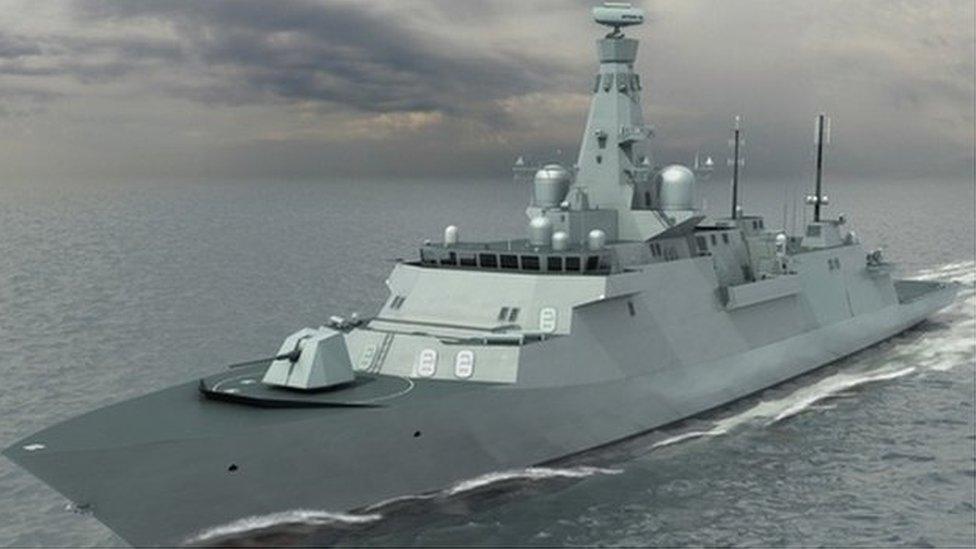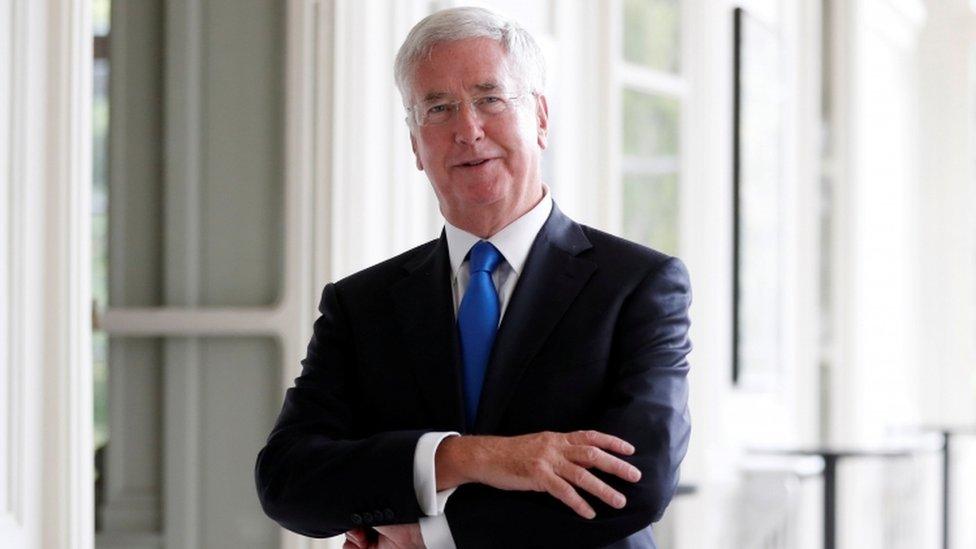MoD accused of 'betrayal' over frigates
- Published

Work on the new Type 26 frigates started at the Clyde yards earlier this year
Shipbuilding unions have accused the MoD of reneging on a promise to build five new navy frigates on the Clyde.
It came as Defence Secretary Sir Michael Fallon announced that five Type 31e frigates could be built and assembled across several UK shipyards.
Unions at the Govan and Scotstoun yards said the work had previously been promised to them.
Mr Fallon said the Clyde yards had already been guaranteed 20 years of work building eight Type 26 frigates.
The five new ships will be in addition to that order, and he insisted it was right to open the contracts up to competition.
An initial contract for the Type 26 programme was based on the assumption that 13 would be built - but that number was later cut to eight following the Strategic Defence and Security Review in 2015.
It was also confirmed that five of the lighter and cheaper Type 31 frigates would be built to make up the shortfall in numbers.
When he confirmed in November of last year that the eight Type 26 frigates would be build on the Clyde, Sir Michael did not say that the five smaller frigate would also be built there - but did say that the yards would be in "pole position" for the work.
Sir Michael has now confirmed that the contract for the Type 31 will be opened up for yards across the UK to bid on, meaning that the work is not guaranteed to come to Scotland.
The move could see the ships built in blocks across several British shipyards and then assembled at a central hub, similar to the approach taken for the Navy's biggest ever ship, the 65,000-tonne aircraft carrier HMS Queen Elizabeth, which was assembled at the Rosyth yard in Fife.
The new Type 31e frigates are due to be in service by 2023, and their cost will be capped at a maximum of £250m each so they can be sold to other countries.

Sir Michael said shipyards across the UK would be able to bid for the Type 31 contracts
The plans form part of a new national shipbuilding strategy which accepts the recommendations of an independent report into the industry by Sir John Parker.
It follows BAE Systems scaling back plans to build a £200m-£300m "frigate factory", external at Scotstoun that would have been capable of mass-producing warships for export.
Gary Cook of the GMB union said the Clyde yards had originally been promised that a total of 13 frigates would be built there as part of a plan that saw hundreds of jobs being lost at the yards and the Portsmouth dockyard closing in 2013.
Mr Cook told the BBC's Good Morning Scotland programme: "These five frigates which Fallon is talking about today were promised to the Clyde as part of the massive cuts.
"In return, we would have had a state-of-the-art frigate factory to be able to produce the ships at the price that the MoD wished to pay, and we could attract foreign orders."
But he said there was "no frigate factory, and now no five ships" and that "there has definitely been a reneging - there has been a betrayal on the 13 frigates on the Upper Clyde".
Built abroad
While Scottish shipyards will be able to bid for the Type 31 contracts, Mr Cook said there were absolutely no guarantee that building work or assembly work would come to Scotland.
And he called for clarity over plans for three new 40,000 tonne Royal Fleet Auxiliary vessels, which could potentially be built abroad as they are not classed as warships.
Mr Cook said: "That is the platform that we need to sustain UK shipbuilding - it is the equivalent of two more carriers."
But Sir Michael told the same programme that the future of the Clyde yards had already been secured for the next 20 years by the contracts to build the eight Type 26 frigates.
He added: "The Clyde are getting eight frigates, the anti-submarine frigates, without competition and that is 20 years of work for just one yard.
"There is a huge frigate building programme on the Clyde but the remaining five frigates in the programme we're opening up to competition.
"Govan can compete for that, so can Fergusons further down the Clyde, they could be built at Rosyth. Any of the yards in Britain will be free to compete."
In the run up to the 2014 independence referendum, unionist politicians stressed that staying in the UK was necessary to secure the future of Scotland's shipbuilding industry.
Scotland's first minister, Nicola Sturgeon, said: "I think people should be looking to the UK government and reflecting on the fact there has been lots of promises made to the Clyde but more often than not those promises are broken."
She added: "Certainly for the Clyde it is only a couple of years ago that workers were being promised a frigate factory on the Clyde - there's no mention of that today.
"So this is about cost cutting and it is another demonstration of the damage that is being done to conventional defence infrastructure by the UK government's obsession with spending billions and billions of pounds on Trident.
"I think workers on the Clyde today have every right to feel let down and betrayed."